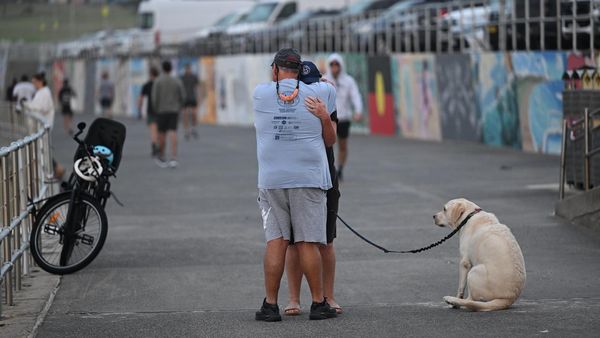
If you logged onto YouTube or Instagram five years ago, you would have been bombarded with product recommendations from social media influencers.
Whether it was the latest Kylie Jenner lip kit or the newest Dyson hair accessorising tool, creators were busy pushing products left, right and centre.
But years later, some social media influencers are taking a drastically different and far more critical approach.
Instead of promoting products they think their followers should purchase, they’re telling them what products aren’t worth their hard-earned cash.
These creators are calling themselves ‘deinfluencers’, with hashtags relating to the trend garnering millions of views in just a matter of months.
Communications experts say the new movement is in response to various social factors, with consumers now critically aware of how much money they’re spending, and how much waste their consumption habits are creating.
Life changing products?
Too often, many influencers insist that various products are “life changing” and “must-buys” – but a new generation of influencers is pushing back.
Lifestyle influencer @basicofcourse is one of many commenting on the gross consumerism pushed in the influencer landscape.
“As a general rule of thumb, I don’t think you need anything from someone who looks like me on TikTok, telling you that something you hadn’t heard of 30 seconds ago was an absolute necessity,” she said.
She then called out a number of growing trends – like ice face rollers and Kim Kardashian’s Skims brand – saying her followers simply “don’t need” all of the viral trends being pushed on their feeds.
Another TikToker, @sophwine_, also shared a video with all the products she regretted buying.
“I should have saved my buck, and this is how you can too,” she said, calling out the products that she said weren’t worth her money.
@basicofcourse Disclaimer! no judgment if you have or want these things! I think we can all just be more intentional in our consumption choices and making sure we genuinelyyy want something rather than being convinced by TikTok that we do! I have no problem with promoting things u truly love, and I do it myself (basic is legit the name) but 2023 is about all abt lowering the consumption game! #sustainableliving #sustainability #deinfluencing #consciousconsumerism #intentionalconsumption #amazonstorefront ♬ Right Back Where We Started From – Maxine Nightingale
@sophwine_ Do we need more #deinfluencer #deinfluencing #productsiregretbuying #whatiorderedversuswhatigot #notworthit #cerave #milkhydrogripprimer #laneige #larocheposay #effaclarduo #cultproduct #viralbeautyproducts #viralproducts ♬ original sound – Soph wine
No surprise
Associate Professor of Marketing at RMIT Dr Lauren Gurrieri said she wasn’t surprised that ‘deinfluencing’ had popped up as a trend.
She said social media creators were becoming more aware of social factors and conversations, and incorporating that into their content.
“The influencer landscape is incredibly dynamic, and I think is reflective of changes in consumer culture and the world of business more broadly as well,” said Dr Gurrieri.
“So something that we’ve seen, particularly take momentum, I think, in the last five years, is this notion of purpose and social change, and involvement in social activism become increasingly important for organisations.
“It’s not surprising, then, that we’re seeing this reflected in the world of influencers as well.”
The ‘ethical influencer’
While influencing was once all about aspirational glitz and glamour, influencers are now speaking candidly about social issues, whether it be consumerism, sustainability, or affordability – given the ongoing cost of living crisis.
These elements, Dr Gurrieri says, have given rise to a new kind of “ethical influencer”.
“This is an influencer, who is using their platform to speak to their audience, about making them consider the impacts of their consumption choices, and possibly to make changes around those consumption choices,” said Dr Gurrieri.
The majority of these conversations are happening on TikTok, where videos on deinfluencing are being viewed by millions.
And these videos are clearly connecting with Gen-Z viewers, thanks to their off-the-cuff, unscripted style.
“Tiktok with its, I guess, kind of tongue-in-cheek sort of sensibility … it’s a more fun way [of communicating], I think,” said Dr Gurrieri.
“So the conversation is a bit less serious. It’s able to anchor and amplify in different ways.”
Long time coming
The ‘deinfluencing’ trend comes off the back of years on end of prescriptive influencing.
Largely thanks to social media, the global beauty industry boomed in the mid-2010s, with brands harnessing the power of the internet to release launch after launch after launch.
Influencers even began to complain that they couldn’t keep up with the brands, and were sent so much free product that they had no choice but to either give it away, or bin it.
Dr Gurrieri says there’s been a growing feeling of fatigue for both creators and their followers, and the ‘deinfluencing’ trend has been a clear response to that.
“There certainly was, I guess, a momentum around social media where it became more and more cluttered with advertising,” she said.
“And just like with other forms of media, there will eventually be fatigue to that, add resistance to that as well. And I think that’s what we’re witnessing.”
‘Authenticity crisis’
The conversation has surfaced just as one of TikTok’s biggest creators was exposed for misleading her audience.
American beauty TikToker Mikayla Nogueira came under fire last week when her followers found she was likely being deceitful in a review that was paid for by L’Oreal.
In her TikTok, the influencer showed her 14 million followers the so-called “results” of her L’Oreal mascara.
She first applied one coat of the product, and said she would apply a second.
But after the video cut, Noguiera could be seen with noticeably longer lashes.
Many said the results simply would not have been possible with a mascara, and she’d likely put on false lashes in between takes.
@mikaylanogueira THESE ARE THE LASHES OF MY DREAMS!! @lorealparisusa never lets me down 😭 #TelescopicLift #LorealParisPartner #LorealParis @zoehonsinger ♬ original sound – Mikayla Nogueira
Her fans expressed disappointment in Nogueira, who they had once relied on as an objective reviewer of makeup products.
This is one of many product endorsement fails in recent years, with celebrities like Millie Bobby Brown, Kylie Jenner and Shay Mitchell all accused of misleading their followers in the past.
Dr Gurrieri said the general public is no longer “satisfied” with this sort of behaviour.
So instead of promoting products, getting ‘real’ about whether they’re good enough is another way for influencers to appear down-to-earth.
“With influencers, it’s certainly a way of presenting yourself in a more authentic way, because there was a bit of an authenticity crisis, I think, around influencers in recent times.”
Virtue signalling
Dr Andy Ruddock, a lecturer in media and communications at Monash University, said the ‘deinfluencing’ trend could certainly be exploited by influencers in order to relate to their audiences.
“I think one of the ways that this actually builds into the, the influencer career is it strikes me [as] a way of signalling authenticity,” he said.
“I think the key thing for an influencer is to appear to be authentic to their audience. And, it does sound cynical, but by using this [approach], it seems a pretty handy way of signalling authenticity saying ‘I’m able to step outside the system, I’m able to see the world from your point of view, I understand you’.”
Dr Gurrieri said not all influencers would be participating in the ‘deinfluencing’ trend with good intentions.
“Because influencers are incredibly good marketers, they’re reading their audiences. And they’re trying to find ways of reconnecting and savouring those relationships so that they can be preserved and leveraged,” Dr Gurrieri noted.
“[Some are] just sadly reading the room on this and saying this is another commercial opportunity.”
Where to from here?
While these ‘deinfluencers’ are creating conversation around consumerism, sustainability and affordability, they often remain that – conversations.
Dr Ruddock said these influencers were putting “a critical lens on consumer society”.
But he said he hoped this discussion would go further than social media – and prompt real change.
“Ultimately, you’re talking about economic systems and policies and stuff like that, and it’s kind of a bit above the pay grade of your average social media influencer,” he said.
“It’s good that it raises consciousness and starts conversations. But then the question becomes, well, how does that actually convert into pressure and change?”







